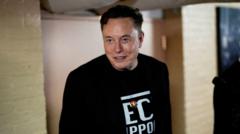In a heated exchange on social media, Elon Musk, the CEO of Tesla and a prominent figure in the Trump administration, has publicly criticized Peter Navarro, a trade adviser, calling him a "moron" following Navarro’s remarks about Tesla's manufacturing process. This dispute illuminates growing tensions between Musk and the White House over trade policies.
Musk and Navarro Trade Barbs Over Tesla's Manufacturing Claims

Musk and Navarro Trade Barbs Over Tesla's Manufacturing Claims
Elon Musk disparages Trump adviser Peter Navarro after comments on Tesla’s role in car manufacturing.
The clash began after Navarro, in a recent interview, referred to Musk as "not a car manufacturer" but merely "a car assembler." This statement emerged while he was discussing President Trump's tariff policy, which aims to encourage domestic manufacturing. In response, Musk took to his platform, X, where he dismissed Navarro's assertions as "demonstrably false" and characterized him as "dumber than a sack of bricks."
Navarro's primary argument emphasized a desire for more manufacturing jobs in the U.S., stating that the American auto industry has become reliant on foreign parts, especially from Germany. He expressed optimism for a future where American-made products would lead to higher wages and profits. In a follow-up to Navarro’s comments, Musk shared a recent article highlighting that Tesla vehicles reportedly contain the highest percentage of U.S.-sourced parts, defending his company's manufacturing integrity.
Dan Ives, an analyst in the tech industry, noted that while Tesla is less exposed to tariffs than traditional automakers, it still sources a significant number of parts from overseas, particularly from China. This constitutes a vulnerability in their supply chain amid ongoing trade tensions.
Musk's sentiments reflect a broader frustration among American business leaders regarding Trump’s trade policies, with many expressing embarrassment on the international stage. A survey discussed by Jeffrey Sonnenfeld, a Yale University dean, revealed that a significant number of CEOs are concerned that these policies could lead to a recession, a sentiment echoed by billionaire fund manager Bill Ackman, who has urged the administration to pause tariff increases to mitigate economic consequences.
As the tension continues, with Navarro, a loyal Trump ally, having previously faced legal issues for ignoring a subpoena related to the 2020 election dispute, Musk’s criticisms not only signify a clash of perspectives on trade policy but also reflect deeper implications for U.S. manufacturing and economic stability amid the ongoing tariff battles.
Navarro's primary argument emphasized a desire for more manufacturing jobs in the U.S., stating that the American auto industry has become reliant on foreign parts, especially from Germany. He expressed optimism for a future where American-made products would lead to higher wages and profits. In a follow-up to Navarro’s comments, Musk shared a recent article highlighting that Tesla vehicles reportedly contain the highest percentage of U.S.-sourced parts, defending his company's manufacturing integrity.
Dan Ives, an analyst in the tech industry, noted that while Tesla is less exposed to tariffs than traditional automakers, it still sources a significant number of parts from overseas, particularly from China. This constitutes a vulnerability in their supply chain amid ongoing trade tensions.
Musk's sentiments reflect a broader frustration among American business leaders regarding Trump’s trade policies, with many expressing embarrassment on the international stage. A survey discussed by Jeffrey Sonnenfeld, a Yale University dean, revealed that a significant number of CEOs are concerned that these policies could lead to a recession, a sentiment echoed by billionaire fund manager Bill Ackman, who has urged the administration to pause tariff increases to mitigate economic consequences.
As the tension continues, with Navarro, a loyal Trump ally, having previously faced legal issues for ignoring a subpoena related to the 2020 election dispute, Musk’s criticisms not only signify a clash of perspectives on trade policy but also reflect deeper implications for U.S. manufacturing and economic stability amid the ongoing tariff battles.






















